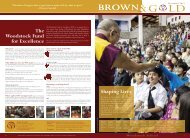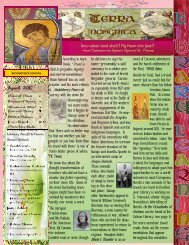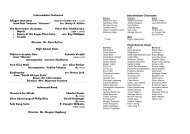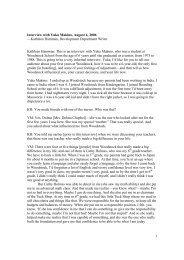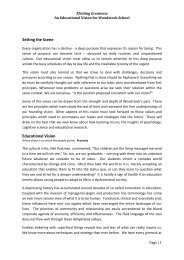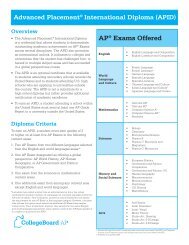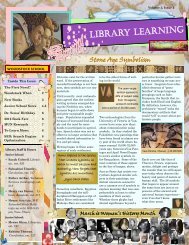Woodstock School Student Recruitment and Admissions
Woodstock School Student Recruitment and Admissions
Woodstock School Student Recruitment and Admissions
You also want an ePaper? Increase the reach of your titles
YUMPU automatically turns print PDFs into web optimized ePapers that Google loves.
<strong>Woodstock</strong> <strong>School</strong><br />
<strong>Student</strong> <strong>Recruitment</strong> <strong>and</strong> <strong>Admissions</strong><br />
Questions frequently asked by parents from Christian churches <strong>and</strong><br />
organisations:<br />
What does it mean for <strong>Woodstock</strong> to be a Christian <strong>School</strong><br />
<strong>Woodstock</strong> <strong>School</strong> was founded in 1854 as a Protestant school for girls <strong>and</strong> for over a<br />
century, from the 1870s, was a mission school serving primarily North American<br />
missionary families working in the subcontinent. When <strong>Woodstock</strong> became an<br />
independent, self-governing school in the early 1970s, it was established on the basis<br />
that it would retain its character as a Christian institution. Over the last thirty-five years,<br />
<strong>Woodstock</strong> has developed its new role as a unique, international residential school for<br />
students from around the world that retains a commitment to its Christian heritage <strong>and</strong> to<br />
Christian beliefs <strong>and</strong> values.<br />
<strong>School</strong>s with a religious label can be controversial in the contemporary world, <strong>and</strong> the<br />
term ‘Christian’ can mean different things to different people. In India, Christian schools<br />
have traditionally been associated with high-quality education <strong>and</strong> committed teachers<br />
<strong>and</strong> staff. <strong>Woodstock</strong>’s attitude to its Christian character is clear: we believe that our<br />
students deserve to be treated as well-rounded human beings, with a spiritual dimension<br />
to their lives. We believe it is important for young people to be free to learn about <strong>and</strong><br />
discuss their own <strong>and</strong> other religious faiths <strong>and</strong> beliefs <strong>and</strong> eventually to make their own<br />
decisions about their world views <strong>and</strong> values. With this in mind, the school incorporates<br />
activities relating to Christianity <strong>and</strong> to other religions within its daily life <strong>and</strong> programmes,<br />
but in such a way as to recognise <strong>and</strong> respect the free choice of all students, as well as<br />
the integrity of students from other faith <strong>and</strong> secular backgrounds.<br />
In order to promote this view of the needs <strong>and</strong> rights of young people, the school<br />
organises required activities, such as whole-school chapels <strong>and</strong> regular morning<br />
assemblies, as well as a religious education programme for all, in which senior students<br />
have a choice of courses about Christianity <strong>and</strong> other world religions. In addition, the<br />
school offers a range of voluntary programmes about the Christian faith, as well as<br />
making arrangements for students from other faiths to participate in their own services<br />
<strong>and</strong> festivals when this is practicable in the school programme.<br />
Two of our twelve Desired <strong>Student</strong> Outcomes (the school’s educational aims) make<br />
particular reference to our objectives regarding students’ spiritual <strong>and</strong> ethical education:<br />
A <strong>Woodstock</strong> student should be:<br />
• Aware of the responsibilities of privilege, concerned for social justice, concerned<br />
about the ethical implications of personal <strong>and</strong> social choices, able to make<br />
decisions based consistently on moral values <strong>and</strong> concern for others, <strong>and</strong><br />
prepared to take opportunities for community service.<br />
• Knowledgeable <strong>and</strong> respectful of the beliefs <strong>and</strong> values of the Christian religion<br />
as well as the other major world religions.
What is the school’s attitude regarding families in Christian service<br />
The majority of teachers <strong>and</strong> other staff are Christians, including a number of Western<br />
staff seconded or supported by mission organisations. About one-half of our students<br />
come from Christian families. The school’s Mission Statement clearly expresses our<br />
purpose <strong>and</strong>, in particular, our continuing commitment to families in Christian service.<br />
<strong>Woodstock</strong> aims to develop responsible global citizens <strong>and</strong> leaders by providing a<br />
world-class international education, rooted in its Christian heritage <strong>and</strong> values, for a<br />
diverse group of students, especially from families in Christian or public service, in an<br />
Indian Himalayan environment.<br />
What opportunities will my child have to learn about <strong>and</strong> develop<br />
his/her own faith<br />
At each level of the school, there are age-appropriate voluntary activities. Elementary<br />
students have a weekly Bible club, “Friendship Club”; Middle <strong>School</strong> students have<br />
“Quest”; <strong>and</strong> High <strong>School</strong> students have Friday Morning Bible Study groups that meet at<br />
6.30 a.m. for study <strong>and</strong> breakfast in a staff home. In addition, there is a Sunday<br />
afternoon Discipleship Group led by the chaplain <strong>and</strong> other staff.<br />
What opportunities will my child have to learn about other beliefs <strong>and</strong><br />
interact with students from other faiths<br />
<strong>Woodstock</strong> students come from all of the major religious communities of Asia, <strong>and</strong> the<br />
school encourages both mutual respect <strong>and</strong> appreciation of shared <strong>and</strong> different values<br />
<strong>and</strong> practices, as well as active enquiry <strong>and</strong> debate, a feature of the <strong>Woodstock</strong><br />
experience that is valued by our students as they progress through the school. In<br />
addition, students learn about the festivals of world religions <strong>and</strong>, especially in High<br />
<strong>School</strong>, have the opportunity to study world religions in the Religious Education<br />
programme. Our policy on religious education is to present the beliefs <strong>and</strong> values of<br />
other religions on their own terms <strong>and</strong> not in comparison with the school’s espoused<br />
Christian beliefs <strong>and</strong> values.<br />
What kind of pastoral care <strong>and</strong> support will my child receive at<br />
<strong>Woodstock</strong><br />
<strong>Woodstock</strong> employs Christian residence staff who have a concern for the spiritual<br />
growth of students in their charge. <strong>Student</strong>s from Christian families are encouraged to<br />
attend a local church or the school’s own voluntary student chapel, <strong>and</strong> there are Bible<br />
studies <strong>and</strong> prayer times in each of the residences.<br />
The voluntary chapel meets each Sunday evening at the residence level for worship,<br />
prayer, <strong>and</strong> Bible teaching. This is increasingly a pastoral care base for a number of<br />
Middle <strong>and</strong> High <strong>School</strong> students who develop relationships with the six or eight staff<br />
who run the chapel. Elementary students in boarding attend Sunday <strong>School</strong> at Kellogg<br />
Church each week.<br />
Isn’t the school full of children from rich families, <strong>and</strong> is there a<br />
conflict of values<br />
There are students from wealthy families at <strong>Woodstock</strong>—we are India’s leading<br />
international residential school, <strong>and</strong> all parents want the best for their children—yet,
many students from families with modest incomes also attend. Although a <strong>Woodstock</strong><br />
education is a privilege enjoyed by a relatively small number of students, we do not see<br />
ourselves as an elite institution or a school for the rich. <strong>Woodstock</strong> is committed to<br />
diversity, <strong>and</strong> while this is most obvious in terms of nationality <strong>and</strong> ethnicity, it also<br />
extends to a commitment to economic diversity, supported significantly by our <strong>Student</strong><br />
Grants programme. We aim to encourage all our students to maintain a modest <strong>and</strong><br />
sustainable life-style regardless of their means.<br />
Can I afford to send my child to <strong>Woodstock</strong> <strong>School</strong><br />
<strong>Woodstock</strong>’s fees are not affordable for everyone. The majority of <strong>Woodstock</strong> students<br />
pay full fees, enabling the school to provide its excellent facilities <strong>and</strong> programmes.<br />
However, we do want to ensure that well-qualified students who could benefit from a<br />
<strong>Woodstock</strong> education <strong>and</strong> contribute to our community are not excluded for financial<br />
reasons. We, therefore, have a well-funded <strong>Student</strong> Grants programme to which parents<br />
may apply.<br />
The <strong>Student</strong> Grants programme covers a percentage of the tuition <strong>and</strong> boarding fees for<br />
students who are offered a place at <strong>Woodstock</strong>. The percentage of grant offered<br />
depends on the family’s financial declaration <strong>and</strong> on the category of priority into which<br />
the student falls, <strong>and</strong> ranges in general from 10-75 percent of the annual cost of<br />
education at <strong>Woodstock</strong>, although in special cases this can be extended to 90 percent.<br />
The grant is renewable annually subject to the family’s financial declaration <strong>and</strong> to the<br />
student achieving the school’s expectations in terms of academics <strong>and</strong> conduct.<br />
Parents do need to be aware that there are additional costs involved beyond the school<br />
fee. For example, Mussoorie is in the hills, <strong>and</strong> a wider range of clothing is required than<br />
in the cities, including cold-weather <strong>and</strong> rain wear. Formal clothes are required for<br />
occasions like chapels, festivals, concert performances, <strong>and</strong> school banquets. Pocket<br />
money will be needed for trips to the bazaar, for Activity Week trips, <strong>and</strong> for other special<br />
occasions. Individual music tuition is an extra charge for those who take lessons or<br />
participate in ensembles. Then, of course, there are the costs of return travel to<br />
Mussoorie twice a year. The <strong>Admissions</strong> Office will be glad to discuss these matters with<br />
you <strong>and</strong> help you plan a budget for your child at <strong>Woodstock</strong>.<br />
Why don’t you offer 100 percent scholarships<br />
We believe that education is a partnership between the school <strong>and</strong> parents, <strong>and</strong> we<br />
require parents to show their commitment to obtaining a high-quality education for their<br />
children through their financial contribution. In addition, it is our expectation that all of our<br />
seniors go on to higher education in India or overseas, <strong>and</strong> it would be irresponsible of<br />
us to offer places in our college-preparatory programme to students whose families are<br />
unable also to support them through university studies.<br />
What happens after they leave – can my children gain entry to Indian<br />
colleges if we can’t afford overseas study<br />
Typically, 25 percent of <strong>Woodstock</strong>’s graduating seniors go on to higher education in<br />
India. In recent years, <strong>Woodstock</strong> students have obtained immediate entry to Indian<br />
universities <strong>and</strong> colleges, including St. Stephens, Shri Ram College of Commerce, Jesus<br />
<strong>and</strong> Mary College, Mount Carmel College, <strong>and</strong> Jain International University.
<strong>Woodstock</strong> offers a broad, liberal arts programme in high school. <strong>Student</strong>s aspiring to a<br />
place in a specialist institution, such as a medical college, IIT, or IIM will probably need a<br />
further year of coaching after they leave <strong>Woodstock</strong>, like their peers from other schools.<br />
If, however, you aspire to overseas education, there is some possibility of scholarship<br />
funding from US colleges, particularly for the children of Christian workers, so don’t<br />
entirely discount that option – although it is still likely to involve significant cost.<br />
How can I find out more<br />
Talk to people who can tell you what you want to know. Your first call should be to our<br />
<strong>Admissions</strong> Office. If we are unable to answer your query, we will put you in touch with<br />
someone who can. You can also talk to parents of <strong>Woodstock</strong> students who are in a<br />
similar position to yourselves. Ask us to forward an enquiry to someone we know would<br />
be willing to talk with you.<br />
Finally. . .<br />
<strong>Woodstock</strong> <strong>School</strong> isn’t the right choice for everyone. Some parents prefer their children<br />
to stay entirely within the Indian system. Some will not be able to afford the costs, even<br />
with support from the Grants Programme, where it is available. However, we want to<br />
open our admissions to a wider group of people within India <strong>and</strong> beyond who are serving<br />
their communities <strong>and</strong> whose children have the potential to make a difference in the<br />
world.





